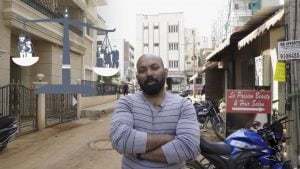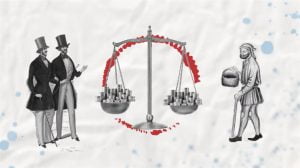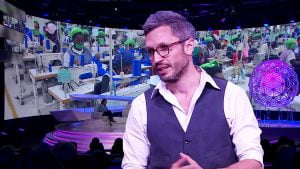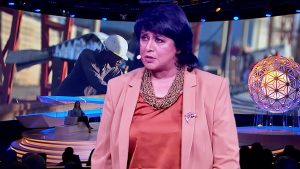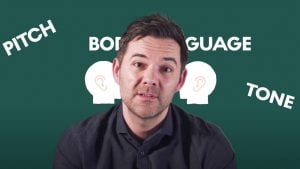
Capitalism
Is capitalism built for today’s challenges, or is it due for sweeping changes?
Unit 1: Doha Debates Asks
Doha Debates Asks: Are People Better Off With UBI?
Essential questions
- What’s the first word you think of when you hear “capitalism”?
- What are some negative effects of capitalism? How worried are you about money?
- What would you do with your life if money didn’t matter?
- How should we deal with rising income inequality? What should companies value more than profit?
- Would we be better off if we had universal basic income?
- Do you think we can live in a world without money?
Unit 2: The Future of Capitalism
The Future of Capitalism
Doha Debates Correspondent Nelufar Hedayat breaks down the current state of globalization.
Essential questions
- What do you think when you hear capitalism?
- What determines what gets made?
- What are the accomplishments of capitalism?
- What atrocities has capitalism facilitated?
- What are criticism of capitalism?
- Can there be continued growth with limited resources?
- What would a kinder capitalism look like?
- Is a universal basic income viable?
Unit 3: The Forgotten History of Monopoly And Other Short Videos
Capitalism: The Surprising History Behind Monopoly
Essential questions
- What was the original reason for the creation of the Monopoly board game?
- How did the Gilded Age influence the board game Monopoly?
- Who created Monopoly?
- What are the main reasons to create a Universal Basic Income (UBI)?
- Would a UBI create a more equal starting point for people?
- How would people spend the money if they receive a UBI?
- How would a UBI affect a person’s well-being?
- What are examples of a UBI?
Unit 4a: Speaker Jason Hickel
Jason Hickel: Economic Growth Is Killing Us
Jason Hickel sees continued economic growth as a path to our downfall, pointing to ecological degradation and climate breakdown. The solution, he argues, lies in a post-capitalist economic system that focuses on scaling back industrial production and energy use instead of mindless, exponential growth. Jason is an anthropologist and author focusing on global inequality.
Essential questions
- Is economic growth killing people and the planet?
- What might a post growth/post production system look like?
- Is it only rich countries that drive growth?
- How might it be possible to stop growth?
- Would there be any benefits to getting rid of public advertising?
- Is it possible to have social growth without economic growth?
- Is justice the antidote to growth?
- Would people be willing to give up products such as beef or large homes?
Unit 4b: Speaker Ameenah Gurib-Fakim
Ameenah Gurib-Fakim: Africa Will Be the Source of A Global Labor Force
Ameenah Gurib-Fakim, the former president of Mauritius and a biodiversity scientist, argues that economic growth is crucial to increasing a nation’s prosperity. She believes that by investing in the social welfare of a country, shared prosperity protects against some of the negative side effects of capitalism.
Essential questions
- Is capitalism the premier economic system?
- Is sustainable development possible without economic growth?
- How does economic growth improve livelihoods?
- How do we confront issues such as chronic poverty, diseases, and climate change?
- Why does Africa have 6 of the 10 fastest growing economies in the world?
- What does inclusive economic growth look like?
- How might economic growth ensure government reforms?
Unit 4c: Speaker Anand Giridharadas
Anand Giridharadas: We Do Not Have Free Market Capitalism
Anand Giridharadas believes that symptoms of capitalism, like vast wealth inequality, chronic poverty, and climate degradation, are not merely a result of capitalism but a result of the choices we've made that have come to define our current capitalist system - one that's been built by and for the wealthy. Growth is desirable, he says, just not under the current economic system we live under. Anand is a political analyst, bestselling author, and editor-at-large at Time magazine.
Essential questions
- Do capitalists fear a truly free market?
- Does banking have undue advantages and immunities?
- Does the oil industry rig policy, use bribery, and spread pseudo-science?
- Does Silicon Valley donate to politics out of fear of a true free market?
- Is capitalism actually just a form of capture for only the few?
- Is “woke” capitalism just a smoke screen?
- What type of capitalism will keep business honest?
Unit 5: Connector
How to get along with other people
Essential questions
- What is a majlis?
- How might governments redistribute wealth?
- Should only wealthy countries cut back on growth?
- Is capitalism a winner take all system?
- Which would be better – poverty reduction or carbon reduction?
- Is all growth equal?
- What way might capitalism change to make it fairer for all people?
- Do young people accept the current capitalist system?
About Deep Dive
Doha Debates hosts discussions on the world’s most pressing challenges to bridge differences, build consensus and identify solutions. In each moderated live debate, experts share their experiences and propose concrete plans. Doha Debates also offers digital resources such as videos and articles to help students build a deep understanding of the issues and to foster ongoing conversations.
